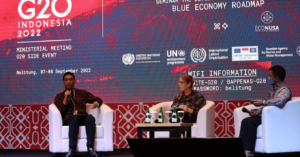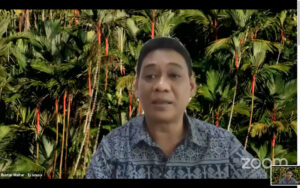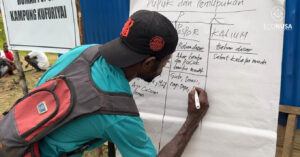
Covid-19 pandemic has sparked new worries on the provision of national food stock. Self-quarantine and the enactment of large-scale social distancing (PSBB) have affected production, cut off supply chain and hampered distribution system.
The Tanah Papua (Land of Papua) with more than 300 tribes has become the most vulnerable region to Covid-19 impact. But on the other hand, the region is deemed resistant to food crisis impacted by the pandemic. They have local wisdom and food security strategy that have been inherited from generations to generations since thousands of years before.
“The tribes in Tanah Papua has local wisdom and food security that has endured since the past 7,000-10,000 years. They could provide local food resources independently,” said Daawia Suhartawan, a lecturer on Biology at Cendrawasih University, on the online discussion on “Scrutinizing Food Security of Indigenous People in Tanah Papua during Pandemic” on 29 April 2020.
Daawia said that modern agriculture management is on contrary to local agriculture in Tanah Papua. He cited an example of agriculture practiced at Mokwam District, Manokwari Regency, in West Papua Province in which peoples cultivate land amidst forest at Arfak Mountain. As to Daawia, they have applied permaculture agriculture concept or agriculture that goes along with nature. This practice was done far before Bill Mollison and David Holmgren introducing this terminology in 1978.
“In addition to forest cropping, there are clean air and herbal products. Research done by forestry experts found that with mobile farming for hundreds of years does not cause landslide,” said Daawia.
Agriculture system that goes along with nature, land rotation and polyculture planting system to resist bug attack could create prominent crop variety. In an agricultural crop expo at Merauke, Papua, it was found a caladium with nearly 1 meter in length, sweet potatoes with more than 1 meter in diameter, black potatoes with more than 2 meters in length. “If we manage the cultivation, the agriculture system could feed Indonesian peoples,” Daawia said.
The founder of Papuan chef community, Papua Jungle Chef, Charles Toto, said that change of time has shifted the consumption pattern of local people. The chef community studies indigenous community wisdom in food consumption. During the pandemic, Chato, Charles’ nickname, jointly with his colleague make a database on food to explore the identity of culinary culture of Papuan community. They found various new methods in food processing practiced by the indigenous community.
Chato collected vegetation seeds that could be planted on the domestic back yard. They teach the local community to cultivate their garden. “We have started planting at all surrounding houses. The urban inhabitants here are the indigenous community that has transformed their lives. We do it to put the vegetation in Papuan forests back in place by utilizing the existing plots,” said Chato.
Similarly, it happened at Sorong Raya, West Papua. Feki Yance Wilson Mobalen, an activist of the Indigenous Peoples Alliance of the Archipelago (AMAN), said that Covid-19 pandemic has encouraged local community to cultivate their garden. They should not leave their domestic plots uncultivated. “The world is now taught to delve into the indigenous peoples and to study from the local to maintain their areas,” said Feki stressing out the importance of local food security amidst the pandemic.
Editor: Leo Wahyudi







